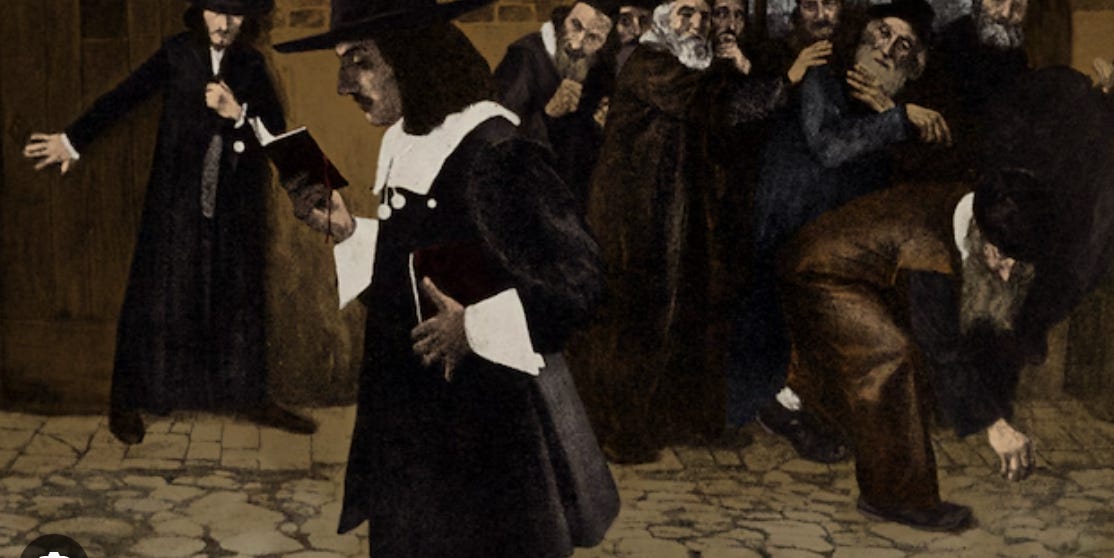THE ESSENTIAL QUESTION TODAY FOR JEWS AND THEIR MANY FRIENDS: ARE YOU A FOLLOWER OF SPINOZA OR SABBATAI?
A Lesson From the Comparatively (in Jewish terms) Recent Past
After 600+ days of war and the utter destruction of Gaza, Israel’s military aims are not close to being achieved. There are still a few living hostages in Hamas captivity hoping to be freed and the corpses of many more to be returned. The population of the Strip still hovers around 2 million despite the deaths of 55,000 Palestinians and the departure of perhaps 100,000 more.
The only reasonable way to describe the Netanyahu government’s military and diplomatic operation is: utter failure.
I started this Substack newsletter on October 8th 2023, I wrote then:
“It is hard to see what the outcome of the slaughter on both sides will be or even what the war’s objectives are.”
And asked of the Israeli government:
“How will you manage to get Israeli hostages, military and civilian, out of Gaza and still extract the blood revenge that not just your coalition partners but many ordinary Israelis will demand?”
After 20 months and an inability to pacify and control Gaza more and more diaspora Jews are willing to say out loud this is a catastrophe but in Israel attitudes have hardened to a degree that goes well beyond an emotional response to a devastating trauma.
Israeli polling firm Geocartography Knowledge Group polled Israelis asking “impolite” questions. The poll was conducted in March and the results collated and published in Ha’aretz on May 28th. Key findings:
Given the IDF’s inability to conquer Gaza, which is about a third the size of London, there is something irrational about these expressions of hate. But the hate is being stoked by messianic fervor of rabbis and senior figures in Netanyahu’s government, like finance minister Bezalel Smotrich

This messianic turn in Israeli life — led by rabbis and their ultra religious flocks — has been decades in the making. Its eruption into the popular will has me thinking of an earlier incident in Jewish history involving rabbis and the messianic. It did not end well.
Come with me to Amsterdam in the middle of the 17th century and let me tell you the story.

It begins with Baruch Spinoza, son of a prosperous trading family in Amsterdam’s burgeoning Sephardic community. In the 150 years since Jews had been expelled from Spain and Portugal, Amsterdam had become the Sephardim’s northern node. (Sepharad is a Hebrew word for Spain, hence Sephardic). A considerable degree of tolerance was extended to Jews by the city’s leaders. The Dutch were building their Golden Age on trade and republican principles. The Jewish community fit in nicely.
Spinoza received a yeshiva education and was praised for his intellect by the rabbis who taught there, but a series of deaths in his family forced him to leave his studies and take over the family business while in his mid-teens.
In 1656, in circumstances that scholars have yet to unravel, Spinoza was the subject of a cherem, a form of excommunication. Among the leaders of the move to expel the young thinker was Amsterdam’s Chief Rabbi, Isaac Aboab da Fonseca. The document survives even if the reason for it is still a matter of debate:
“By decree of the angels and by the command of the holy men, we excommunicate, expel, curse and damn Baruch de Espinoza, with the consent of God, Blessed be He, and with the consent of the entire holy congregation …
Cursed be he by day and cursed be he by night; cursed be he when he lies down and cursed be he when he rises up. Cursed be he when he goes out and cursed be he when he comes in ...
We order that no one should communicate with him neither in writing nor accord him any favor nor stay with him under the same roof nor within four cubits in his vicinity; nor shall he read any treatise composed or written by him.”
To be cast out in this way was more than psychologically painful, it was physically dangerous. The modern idea of the individual making his own way in the world did not exist yet. In the seventeenth century, the community was your identity and the source of protection, friendship and security. This was doubly true for Jews who at best were merely tolerated wherever they were found. In a world where they had no citizenship and no national place of belonging, the community was the only constant in Jewish existence and when its leaders chose to expel someone it was a sentence of living death. Excommunication was a powerful tool of coercion for maintaining community coherence and discipline.
Spinoza embraced the expulsion, telling a friend:
"They do not force me to do anything I would not have done of my own accord, if I did not dread scandal ... I enter gladly on the path that is opened to me."
Freed from the obligations of community conformity — particularly about religion — Spinoza followed this new path for a decade wherever reason and his considerable learning took him. He did not write much for publication — my guess is that the example of Galileo, whose trial 30 years earlier urged him to caution — but his correspondence with a Europe-wide circle of the leading scientific thinkers of his time built his reputation.
Then in 1670 he anonymously published his Tractatus Theologico Politicus, the several subtitles summarize what the book is about quite clearly:
An entire book dedicated to a rational enquiry into what the Bible is, how it was compiled and, most important, why open rational discussion of the facts doesn’t disturb the peace of a society but is necessary to maintain it. Trust me, no one had ever written such things.
While Spinoza was quietly walking the path that led to this seminal book — it is impossible to overestimate how important it is in shaping ideas that a century later would lead the Founding Fathers to enshrine the separation of Church and State in the Constitution — in the eastern Mediterranean a charismatic figure had arisen among the region’s Jews. Sabbatai Zevi, born in Smyrna (today, Izmir, Turkey) was a charismatic Jewish teacher and ascetic, who proclaimed himself the Messiah.
The times allowed for such a claim. Around Europe, particularly in England, millenarian ideas centred on the approaching year 1666 were circulating. Meanwhile, in what is today Ukraine, the Khmelnytsky pogroms, a series of massacres related to a Cossack uprising against Polish-Lithuanian rule, had seen tens of thousands of Jews slaughtered. Millenarian prophecies of Jews returning to the land of Israel found willing listeners among the brutalized Ashkenazic population.
Sabbatai’s chief proselytizer, the ironically named Nathan of Gaza, spread the word around Europe. In some parts of the Ashkenazic heartland people began to tear down their houses and prepare for another Exodus.
Among those who enthusiastically endorsed Sabbatai’s claims was Amsterdam’s chief rabbi, Isaac Aboab da Fonseca and other religious leaders of the community, who had ratified the excommunication of Spinoza.
Then it all unraveled. Sabbatai was arrested by the Ottoman Sultan Mehmet IV and taken for interrogation. He was offered a choice: submit to a trial of faith that involved some fairly painful ways to die or convert to Islam. There was no great agon, no heroic long night of the soul for the “messiah”. Sabbatai instantly agreed to convert and so did many of those who had gone to Smyrna to be part of his flock. And that was it. For the most part the air went out of the Sabbatai bubble.
Fonseca continued his duties as chief rabbi. There is no indication he felt chastened by his endorsement of a false messiah, and he certainly did not extend an olive branch to his former pupil Spinoza in the form of rescinding the cherem.
When it comes to holding a grudge we Jews are world class. IN 2017 I made a BBC radio program on Spinoza called God Intoxicated Man. I interviewed the then leader of Amsterdam’s Sephardic community who told me the cherem was an eternal curse and should never be lifted. He meant it.
So this is why I ask the question: Are you a follower of Spinoza or a follower of Sabbatai?
Spinoza’s thought, particularly on separating religion from the government and extending tolerance to all forms of worship is the foundation for the theoretical thinking that led over centuries to the creation of modern republics, and the emancipation of Jews from their ghettos which ultimately led to Zionism and the creation of the State of Israel.
Sabbatai’s adventure led to … nothing.
60 years ago, in Hebrew School we were taught about the great intellectual achievements of modern Jewry in the centuries after we were let out of the ghetto. Sabbatai and his followers were held up as an example of what happens to those who indulge in messianic thinking.
But today in Israel that lesson has been forgotten. Finance minister Smotrich and Security Minister Itamar Ben Gvir were described as messianic even before the Hamas atrocity of October 7th. Now their kind of messianic thinking dominates Israeli discourse. In the long run this messianism is not likely to lead to any happier outcome than any other moment in Jewish history when false messiahs roamed.
That’s why I think it is important for contemporary Jews (and their friends), in the diaspora or Israel, to ask themselves: Are you a follower of Spinoza or a follower of Sabbatai? Are you prepared to be guided by reason, or the irrational? How best do you secure the future of Israel and the entire Jewish community?
The answer is simple and it has nothing to do with the policy of the current Israeli government.
Listen to my BBC radio epic on Spinoza:









fascinating piece Michael - hard not to imagine that many maga people, Vought and Johnson come especially to mind, are looking forward to the last messianic battle - after all, we have to support Israel not because of past events, but because it’s the foretold venue for the Big One - among my friends, Gaza is the most difficult issue, people appalled, Jews torn, friendships strained - reading film writer David Thomson recently, he used the phrase “failed species” in regard to us, lovable and comfort loving high primates that we are - hard not to agree, especially every night on PBS (btw, are they job interviewing when they’re “away”?) when they run the Gaza numbers. great to read this - best of luck